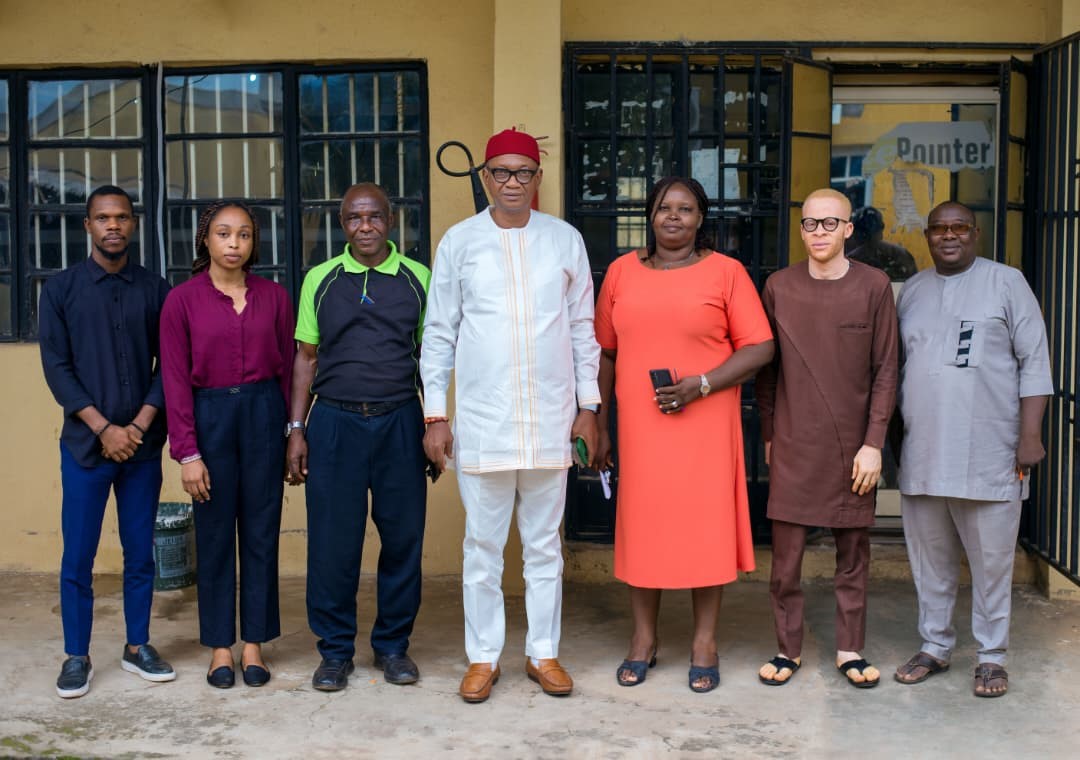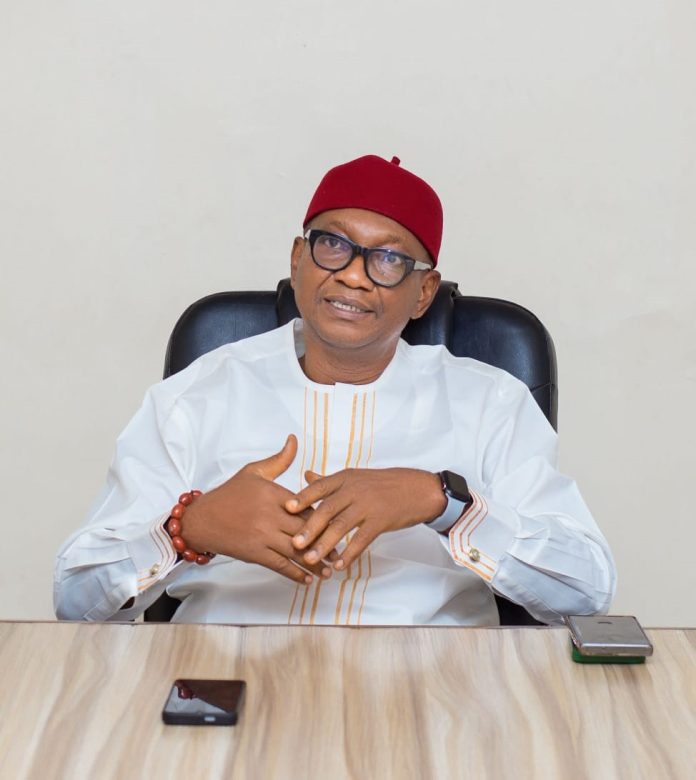Sir Chief Nkemchor Chukwuemeke Okwuokenye, is the Ineh of Owa Kingdom, and the Proprietor of Calvary Nursery, Primary/ Secondary School, as well as Calvary Polytechnic in Owa-Oyibu. He is a retired oil and gas Engineer/Project Manager from Shell SPDC. In our Platform today, he narrates his experience in the Oil company, his passion for education, the problem of the moribund refineries in Nigeria, and many more. Excerpts.

What informed your decision to float a school?
Thank you. It’s my passion. Engineering, education, and the medical field has been my passion for a long time. I studied Engineering, and I have been doing engineering works for the past 40 years. As for education, we started up Calvary Nursery, Primary and Secondary School over 30 years ago, with my late mother, who was a seasoned teacher, in charge.
Thereafter, I tried to start up a medical venture, but was wasn’t encouraged enough. However, I started up a facility where optical lenses were manufactured in Port Harcourt. After my retirement, I established Calvary Polytechnic in Owa-Oyibu.
But essentially, the aim is to give back to the society that brought me up. So, that’s why I went into education, and medicals, and after my retirement, engineering reports, research, and then some projects.
What impact have you made on people’s lives via your schools?
With our schools, we have made remarkable impact on our students, past and present, especially from the community and outside the community.
For instance, I was at a wedding, where I was made the chairman. But as I entered, somebody stopped and greeted me. Thereafter, he introduced himself. I said I don’t know him. He said he was one of those who studied at Calvary Group of Schools. He’s now a medical doctor.
He was very happy that he associated with us, that he was once a student of the school. He confessed that the discipline, the skill, and the education that were passed on to him have affected his life positively.
As I sat down, I was told that the bride, though she came to my place earlier with her mother, is also a medical doctor, and she also passed through Calvary Schools. So, when I was praying for them, she was almost overwhelmed The story goes on and on. I felt fulfilled.
If I didn’t feel fulfilled as an Engineer, I think I felt fulfilled as an educationist because I see people who were once students in my school doing very well. We have tried to ensure that we instil the passion in them, that education is important.
Over the years, we’ve had between 98 per cent to 100 per cent success in our external exams- Junior WAEC (JS3), Primary Six, and Senior WAEC (SS3). So that is my joy and I’m happy about it.
The Calvary Group has grown over the years. Why the choice to float a polytechnic and not a University?
The conditions for establishing a Polytechnic and a University are not the same.
One is more expensive than the other.
There was a time when a Polytechnic was required to have almost 50 hectares of land, while a University required a minimum of 100 hectares. You see, it’s not easy. Maybe it was easy 50 or 80 years ago, but now getting 50 hectares of land, you will agree with me, is not easy.
During my time, it was initially 50 hectares, but after a meeting, the board allowed me to have 20 hectares, with the belief, instruction, or direction that I would not be building bungalows, but high-rise structures. That is one of the requirements. They are many.
So when you look at the conditions, you decide, you should cut your coat according to your size. Isn’t that how they say it?
What’s your take on the discrimination between University and Polytechnic graduates at point of employment, particularly in the civil and public service?
Well, the good news is that the matter is in the process of being rectified by the the Federal Government. Whether it’s on paper or in reality, it’s still better than when nothing was done about it. Secondly, Polytechnic education is more technical, and the focus is the industry.
A Polytechnic is not necessarily for those who could not secure University admission.
Recently, the Federal Government and the NBTE have approved or are expanding Polytechnics to be able to offer Masters programmes. You see, each country has its education and production policy. When you discover that, production-wise, you are not meeting up, then you need to change your policy such that it encourages production and industrialisation. That is why technical education is important, and the Polytechnic comes in here.
When we had a number of industries in our country, we needed many Polytechnic graduates. When I was in Germany, the focus was technical practitioners, because it’s an industrialised nation. When they feel they don’t need technicians or technologists again, they change the policy. So it depends on policy. People need to understand what their interests are.
I would not like to float a university for doing so sake. My passion is technical education, the Polytechnic, and I’m happy that I’ve seen it through to approval stage by the Federal Government.
There are a number of things that a Polytechnic graduate can do, independent of government job because of the technical skills he has acquired I school.
I know quite a number of them who passed through my school who are computer and IT specialists. They own their own businesses now. It doesn’t, however, mean that the university graduates are not enterprising, or that they can’t be entrepreneurs. They can, but the focus should be on technical education because of the high rate of unemployment bin the country and the world today.
Do you think that there is any difference between the courses that are offered in a polytechnic and in a university?
I have been opportuned to pass through the Polytechnic system in and outside the country; and the university system in and outside the country, and also been opportune to work in corporations, in companies that utilize the expertise of these institutions. For instance, I worked in my early years in NNPC. We supervised the construction and erection of Carbon Black Petrochemical, in 1985 or thereabout, in Warri, and the Linear Alkyl Benzene plant in Kaduna; we supervised it. Those facilities were built by German companies, and Germans focused on technologies more, you see.
What made them successful in Nigeria was that their functions were very well defined. There were very few university graduates who were managers, to manage. You know, there are some courses that are taught in the universities, which enabled them, but there are courses that are taught in the Polytechnic system, which make them more of a hands-on experience.
It doesn’t mean that going to Polytechnic is for the downtrodden or you can’t go to university, or that you will not be promoted.
Nigeria turned 65 this month. So far, so good. How would you rate the education sector?
We are a developing nation. That is, we are still like babies, trying to find our feet. Yeah, it’s unfortunate, you know. People or nations don’t develop at the same rate or the same pace. Some are faster; they were born on the same day, but some develop faster. Some start walking faster than others, and some start running faster than others.
Nigeria at 65 is called a developing nation. There are many implications to that, you know. It means that we have not reached maturity. We have not been able to perfect, or actualise what we are supposed to. So that affects our educational policy. It affects our industrialisation. It affects our relationships, even it affects our politics.
So, you can have a politician with a particular agenda. It may not be in the interest of the country, but he is there, and he is our leader. What do you do? And then the policy of the government also depends on the people at the helm of affairs. There are some nations where wrong policies are made, and the leaders are removed almost immediately; you are aware of that. But here, people tell you, “Well, if you’re not happy, go to the court.” Have you not heard that before?
So, I will say Nigeria has tried. Nigerians are great. They are wonderful and very intelligent. If you meet them in the US, you will be surprised at their performance. Some people who went to university in Nigeria and then went to the US are successful Surgeons and Aeronautic engineers, and so on. You meet them in Germany, it is the same thing. However, when they are home, they are still strong and intelligent, but the atmosphere affects them.
You attended a public primary school, went ahead to attend Edo College, and studied abroad. How do you compare education then, when you went to Edo College from a public school, and now that public schools in villages cannot compete with private schools?
That was why I said it boils down to the fact that we are a developing nation.
If you start, for instance, from a particular point and you are going to another point, say, from point A to point B, and you work to point A, the way you worked in point B, you have not progressed.
Now, if your policy on day one is the same policy you are embarking on on day two, it means that you have not progressed. So that is the challenge we have in the education sector in Nigeria, and by God’s grace, we will overcome.
Information has it that you are working on a project where flared gas can be converted to energy. We would like to know how you are planning to achieve that.
Well, it’s simple. For us who are in Engineering and who have done projects, we know that this gas that is flared is from gas and crude oil. Crude oil consists of gas and other things. So, that is what you use to power your turbines that gives you electricity.
Now, there are different types of purities or impurities of crude oil. But for the purpose of patency, I wouldn’t discuss the details in the press.
What is your take on the recent faceoff between Dangote Refinery and PENGASSAN?
Well, it’s a sad story. I don’t have all the facts, but PENGASSAN is saying that all the staff of the refinery should be members of their union. That is the excuse that they are giving. But I know that Dangote had accused NUPENG and all those unions or bodies of extracting too much money from the refinery, maybe through the truck drivers, thereby making the cost of the product very expensive, or more expensive. And he quoted the amount.
I don’t think it’s the union issue but a cover up. I think it’s more of “do me, I do you”, and then politics. That is what I think. I may not be right.
It also boils down to the issue developing nation that I earlier mentioned. These are the kinds of things you see in a developing nation. Some things look abnormal. You can’t do this kind of thing in Germany or in Israel, or even in Romania. I mean, you can’t do that.
What do you think is the reason why Nigerian refineries have become non-operational?
Nigerian refineries were working perfectly in the 80’s, late 70’s, 80’s, and early part of 90’s, but suddenly something started happening. I think it’s politics, bad politics, and corruption.
Let me make an analogy here. some people are working hard, as we are all working hard here. If for example, in the newspaper, you are being paid ₦100,000 monthly, and you hear that your manager is using a jet with Rolls Royce, flying it up and down, and his family is based maybe in the moon or somewhere. You may start thinking and ask yourself questions. This can agitate the workforce, their moral may become dampened, and may refuse to work.
That is what is happening in the industry. That’s one part of it.
The other part is corruption and government’s attitude, or the attitude of the politicians. Some of the equipments in the industry that you hear are not working, if you go there, they are working. And then when they tell you they want to, what do they tell you? “maintenance”. And when they tell you the amount of money needed for the maintenance, it’s enough to build a new refinery in a place like Romania. It’s as bad as that.
Then someone will start wondering, if during my time as a minister I could go through to get that kind of money from the Federal Government, and then a good chunk of it goes into my pocket and the pocket of my colleagues, tomorrow won’t another minister like to do the same?
So it is more intentional. Operating a Refinery is no rocket science technology. It is what you and I can do. Even the manufacturing of the vessels and the pipes is what Nigerians can do easily if you encourage them and develop in the right direction.



